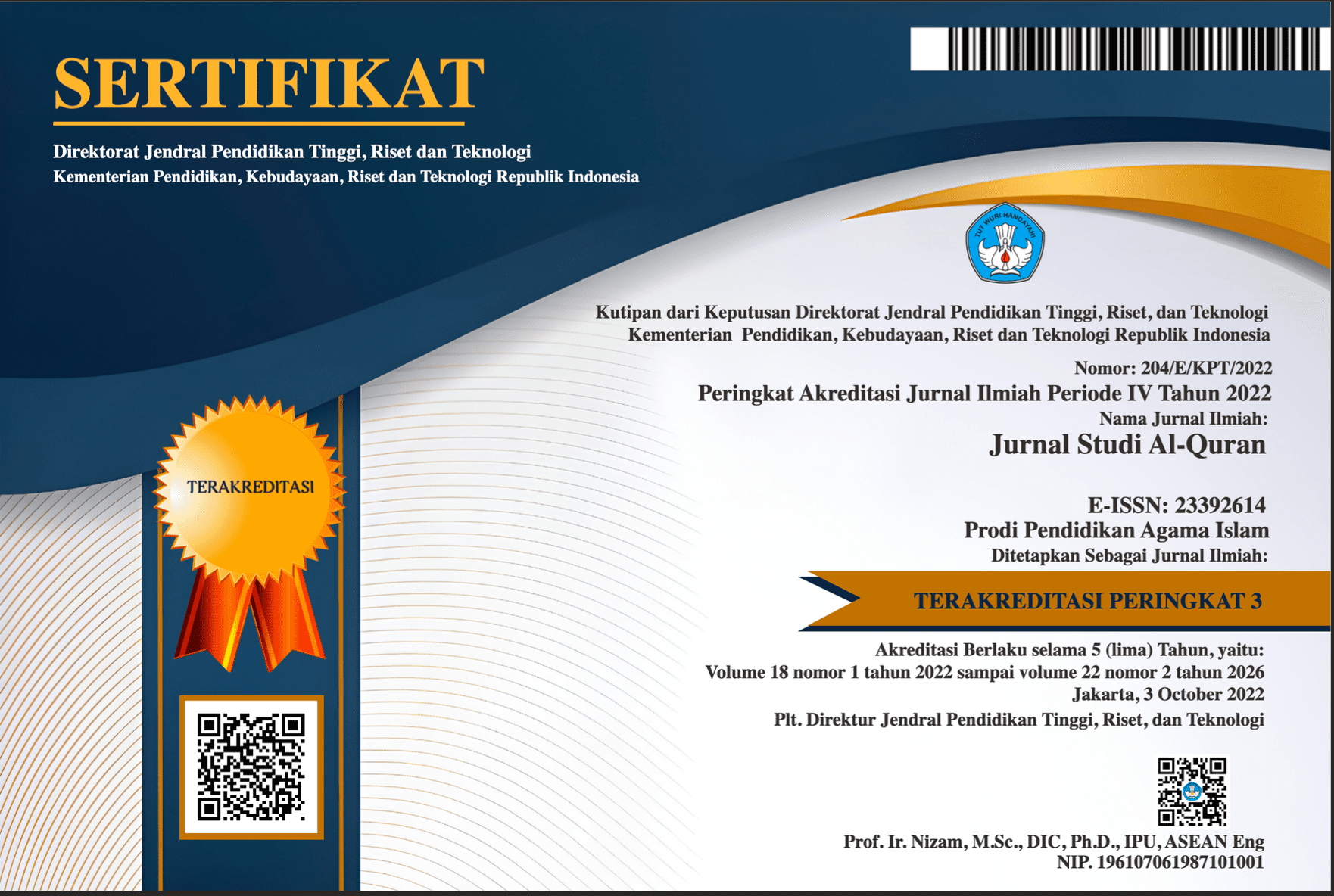Konsep Persaudaraan Sebagai Profetik Sunnah dalam Perspektif Mahasiswa Fakultas Ilmu Sosial UNJ
DOI:
https://doi.org/10.21009/JSQ.014.2.05Keywords:
Konsep persaudaraan, Profetik, Sunnah​Abstract
This study aims to get answers about the understanding of Muslim students about the concept of brotherhood as a science of prophetic sunnah environment Faculty of Social Sciences. This reaserch used the qualitative method with questionnaire instrument means that the researcher has determined some answer chosen by the respondent representing from the students at the Faculty of Social Sciences. Sunnah became a role model and became a science for his followers. With indicators of the role model in the form of the power of brotherhood that produces unity and peace, strong fraternity can eliminate the jealousy and give happiness, the brotherhood can cultivate sympathy and empathy as human beings, the cooperative culture called by the Indonesian nation is the embodiment of the understanding of brotherhood solid, the Indonesian nation is very strong as a strong force.
Keywords: The concept of brotherhood, Profetik, Sunnah
Abstrak
Penelitian ini bertujuan untuk mendapatkan jawaban tentang pemahaman mahasiswa muslim tentang konsep persaudaran sebagai ilmu profetik sunnah dilingkungan Fakultas Ilmu Sosial. Yang dilakukan dengan menggunakan metode kualitatif dengan instrumen kuisioner tertutup artinya peneliti telah menentukan beberapa jawab yang dipilih oleh responden yang mewakili dari sitiap prodi yang ada di Fakultas Ilmu Sosial. Sunnah lebih dikenal semua perbuatan nabi Muhammad menjadi suri tauladan dan menjadi ilmu bagi pengikutnya. Dengan indikator suri tauladan berupa;kekuatan persaudaran yang menghasilkan kesatuan dan kedamaian, persaudaran yang kuat dapat menghilangkan rasa dengki dan memberikan kebahagian, persaudaraan dapat menumbuhkan simpatik dan empati sesesama manusia, budaya kerja sama yang diserukan bangsa Indonesia adalah perwujudan dari pemahaman persaudaraan yang kokoh,persaudaraan bangsa Indonesia sangat kuat sebagai kekuatan yang kokoh.
Kata kunci: Konsep persaudaraan, Profetik, Sunnah
References
Abul Hadi , Abu Muhammad Abul Muhdi bin Abdul Qadir., 1997, “Thuruq Takhrijâ€, (Kairo: Dar al-I’tisham)
Al-Nawawiy, Muhyiddin. 1994, “Syarh Shahih Muslim†(Berut: Dar Al-Khair)
Hamadah, Faruq., 2008, “al-Manhaj al-Islami fi al-Jarh wa al-Ta‘dil Dirasah Manhajiyyah fi ‘Ulum al-Hadithâ€, (Kairo: Dar al-salam li al-taba‘ah wa al-nashar wa al-tawzi‘ wa al-tarjamah).
Ibn Qutaibah, Abu Muhammad Abdullah bin Muslim., 1904,“ al-Imamah wa al-Siyasah li Ibn Qutaibahâ€.
‘Itir Nuruddi., 1997, “Manhaj al-Naqad fi ‘Ulum al-Hadithâ€, Damaskus: Dar al-Fikr.
Izzuddin, M. Kamaluddin., 1984, al-tarikh wa al-manhaj al-tarikhi li Ibn Hajar al-Asqalaniâ€.
Jalal al-Suyuthi., 1415 H, “Tadrib al-Rawi fi Sharhi Taqrib al-Nawawiâ€, Riyad: Maktabah al-Kautar.
Kasim, Moh., 2008, Penelitian Kualitatif dan Kuantitaf, Malang: UIN Press.
Kuntowijoyo, 1991, “Paradigma Islam Interpretasi Aksi, (Bandung: Mizan)
Kamus Besar Bahasa Indonesia. 1998, Jakarta: Balai Pustaka
LÄwÄ«, Amin Abu, 1997, Ilmu Usul al-Jarh wa al-Ta‘dil, SaudiArabia : Dar ibn ‘Affan.
Musthafa, Muhammad., 1982, “Manhaj al-Naqdi ‘inda al-Muhaddii in Nashatuhu wa Tarikhuhâ€, Riyad: Shirkah al-Taba‘ah al-‘Arabiyyah al-Su‘udiyyah, al-‘Imarah.
Nasir, Al-Sadiq Bashir., 1992, “ Dawabith al-Ruwah ‘Inda al-Muhaddit inâ€, Libiya-Tharablis: Manshurat Kulliyah al-Da‘wah al-Islamiyyah.
Nur Wali, Abdul Aziz Muhammad ., 1415 H, “Atar al-tasyayyu‘ ‘ala al-riwayat al-tarikhiyyah fi al-qarni al-awwal al-hijriâ€.
Shiddiqi, Nourouzzaman., 1989, Pengantar Sejarah Muslim, Yogyakarta: Penerbit Mentari Masa.
Syakir, Ahmad Muhammad “al-Ba‘t al-Hatit Syarh Ikhtisar ‘Ulum al-Hadit†lil Hafiz Ibn Katirâ€, Berut: Dar al-Kutub al-‘Ilmiyyah.
Saifuddin, 2007, Tadwīn Hadis Kontribusinya dalam Perkembangan Historiografi Islam, Disertasi, Perpustakaan Sekolah Pascasarjana UIN Jakarta.
Suryadi., 2012, Metodologi Ilmu Rijal Hadis, Yogyakarta: TH-Press.
Zuhri, Muh., 2011, Hadis Nabi Telaah Historis & Metodologis, Yogyakarta, Tiara Wacana.
Downloads
Published
How to Cite
Issue
Section
License
Authors who publish with this Journal agree to the following terms:
- Author retain copyright and grant the journal right of first publication with the work simultaneously licensed under a creative commons attribution licensethat allow others to share the work within an acknowledgement of the work’s authorship and initial publication of this journal.
- Authors are able to enter into separate, additional contractual arrangementfor the non-exclusive distribution of the journal’s published version of the work (e.g. acknowledgement of its initial publication in this journal).
- Authors are permitted and encouraged to post their work online(e.g. in institutional repositories or on their websites) prior to and during the submission process, as it can lead to productive exchanges, as well as earlier and greater citation of published works.
Users/public use of this website will be licensed to CC BY










